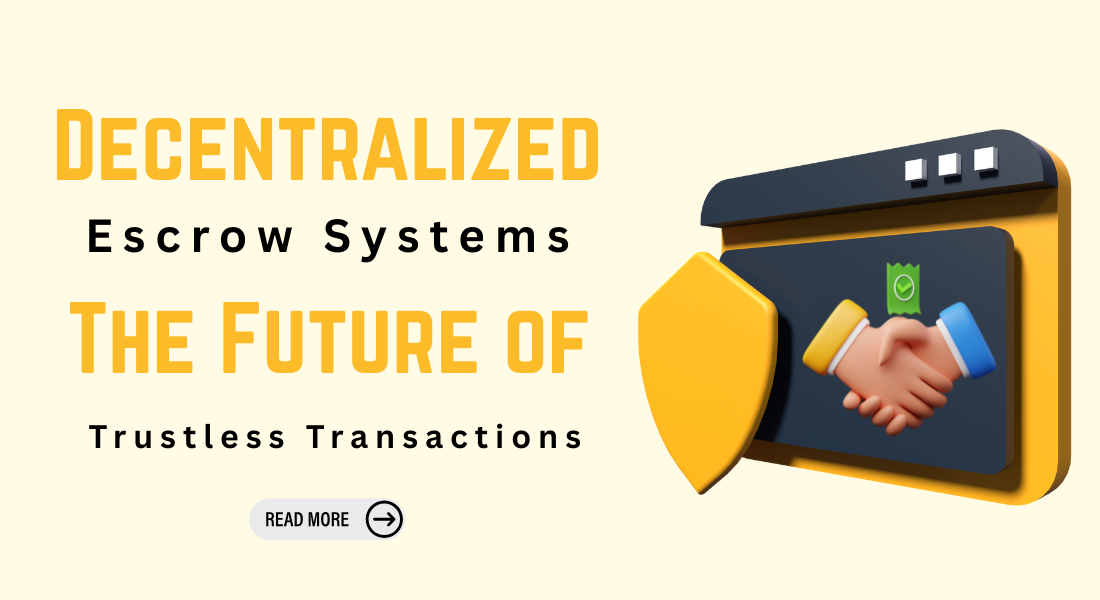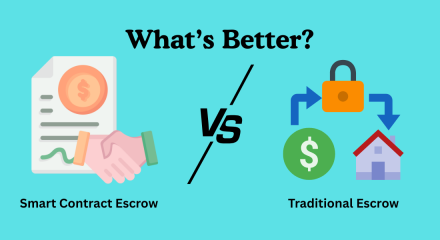
Decentralized Escrow Systems: The Future of Trustless Transactions
In the world of transactions, trust has always been the cornerstone upon which exchanges are built. From traditional financial systems to digital marketplaces, individuals and businesses have relied on trusted intermediaries such as banks, brokers, and third-party service providers to ensure that agreements are fulfilled fairly. However, the emergence of blockchain technology is beginning to challenge this age-old model by offering a decentralized solution that enables trustless transactions. Among the most revolutionary innovations is the decentralized escrow system.
What is an Escrow System?
An escrow system is a third-party arrangement that ensures both parties in a transaction uphold their end of the deal. The process involves an impartial intermediary holding the assets or funds in a secure account until certain conditions are met. Once the conditions are fulfilled, the assets are transferred to the appropriate party. This system mitigates the risks of fraud, non-performance, or failure to deliver, offering both parties peace of mind.
In traditional settings, this intermediary is typically a bank, an attorney, or a trusted service provider. While this setup works well in many situations, it comes with significant drawbacks such as high fees, lengthy delays, and a reliance on central authorities that are vulnerable to corruption, errors, or even cyberattacks.
Enter Blockchain: A New Paradigm for Trustless Transactions
Blockchain technology, the decentralized ledger system that underpins cryptocurrencies like Bitcoin and Ethereum, offers a powerful solution to the limitations of traditional escrow. Blockchain's key innovation is its ability to create trustless environments, where transactions can occur securely without the need for a centralized authority. This trustlessness is a game-changer for industries that have historically depended on intermediaries to validate and ensure the reliability of transactions.
Decentralized Escrow: How Does It Work?
A decentralized escrow system operates directly on a blockchain, utilizing smart contracts to enforce the terms of an agreement without the need for any intermediaries. Smart contracts are self-executing agreements where the terms of the contract are directly written into code. These contracts automatically execute and enforce themselves once the predetermined conditions are met, eliminating the need for manual intervention.
Here’s a simple breakdown of how a decentralized escrow system works:
-
Agreement Setup: Two parties agree to the terms of a transaction. These terms, which might include payment amounts, delivery timelines, and conditions for the transfer of goods or services, are encoded in a smart contract.
-
Depositing Funds or Assets: Once the agreement is in place, the buyer deposits the agreed amount of cryptocurrency or digital assets into the smart contract’s escrow account. This account is controlled by the blockchain, ensuring that only the smart contract has the authority to release the funds.
-
Verification of Terms: As the transaction progresses, the smart contract monitors the agreed-upon conditions. For example, it might confirm that goods have been delivered or that services have been rendered as per the contract.
-
Finalizing the Transaction: If the conditions are met, the smart contract automatically releases the funds or assets to the seller. If the conditions are not met, the funds are returned to the buyer. The entire process is transparent, immutable, and secure, with all parties able to verify the transaction on the blockchain.
This entire process occurs without the need for any intermediary, which significantly reduces the risk of fraud and error and eliminates the fees associated with traditional escrow services.
Benefits of Decentralized Escrow Systems
-
Trustless Transactions: Perhaps the most compelling advantage of decentralized escrow is the ability to conduct trustless transactions. Neither party needs to trust each other or a third-party intermediary. Instead, they can trust the blockchain and the smart contract that enforces the terms of the agreement.
-
Lower Costs: Traditional escrow services often come with high fees that can range from a few percentage points to a flat fee depending on the size of the transaction. Blockchain-based escrow systems eliminate these fees, as there is no need for third-party intermediaries, legal services, or banks to facilitate the transaction.
-
Speed and Efficiency: Blockchain transactions can be processed almost instantly. While traditional escrow systems often involve delays due to manual processing, blockchain-based systems operate automatically and can settle transactions 24/7, regardless of geographical location or time zone.
-
Transparency and Immutability: Since all transactions on the blockchain are publicly recorded and immutable, both parties in a transaction can independently verify that the terms have been met. This transparency reduces the chances of disputes and ensures that all parties are held accountable.
-
Security: Blockchain’s decentralized nature makes it highly secure. Data is distributed across a network of nodes, making it resistant to hacking and data manipulation. The encryption used in blockchain systems ensures that sensitive information, such as payment details, is kept secure.
Use Cases of Decentralized Escrow Systems
The potential applications of decentralized escrow systems span across a wide range of industries, from finance and real estate to e-commerce and beyond. Let’s explore some prominent examples:
-
Cryptocurrency and Peer-to-Peer (P2P) Transactions: In the cryptocurrency space, decentralized escrow is used to facilitate P2P exchanges of digital currencies. Platforms like LocalBitcoins use escrow systems to ensure that both the buyer and seller fulfill their obligations before the cryptocurrency is exchanged. This system mitigates the risk of one party failing to deliver the agreed-upon cryptocurrency or payment.
-
Real Estate Transactions: Real estate deals often involve large sums of money and require complex processes with multiple intermediaries, such as banks, notaries, and real estate agents. A decentralized escrow system could simplify and expedite the process by automating the transfer of funds and ownership once all conditions, such as property inspection or document verification, are met.
-
Freelance and Gig Economy Platforms: Freelancers and clients in the gig economy are increasingly using decentralized escrow systems to ensure that services are rendered and paid for fairly. By depositing funds into a smart contract, both parties can be confident that the job will be completed before the payment is released, and the freelancer knows they won’t be scammed.
-
Online Marketplaces: Platforms like eBay or Amazon often act as intermediaries between buyers and sellers to ensure safe transactions. A decentralized escrow system could replace these intermediaries, offering lower fees and faster transactions while still ensuring that products are delivered before funds are released.
-
Supply Chain and Logistics: Decentralized escrow systems could be used to track and validate the transfer of goods in the supply chain. Once a product is shipped and confirmed as received by the buyer, the funds held in escrow will be released, streamlining the entire process and reducing the need for paperwork and manual verification.
The Road Ahead for Decentralized Escrow Systems
While decentralized escrow systems hold great promise, they are still in the early stages of adoption. There are several challenges to overcome, including regulatory issues, scalability, and the need for wider acceptance of blockchain technology. However, as blockchain technology continues to mature and gain mainstream recognition, we can expect to see an increasing number of industries adopting decentralized escrow systems.
The future of transactions is undoubtedly moving towards more autonomous, trustless, and decentralized solutions. By removing intermediaries, lowering costs, increasing transparency, and enhancing security, decentralized escrow systems are poised to disrupt traditional trust systems across industries.
As this technology evolves, it could lead to more efficient, fair, and transparent marketplaces and provide an alternative to the costly and time-consuming processes we rely on today. The potential to create a truly global, decentralized, and trustworthy transactional environment could change the way we exchange goods and services forever.
In conclusion, decentralized escrow systems are more than just a technological innovation; they represent a shift in how we think about trust in the digital world. The future of transactions is trustless, automated, and decentralized, and blockchain-based escrow systems are leading the way.





